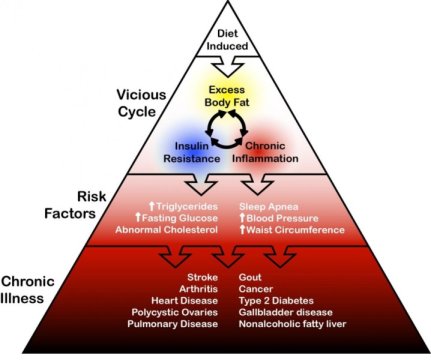New Study: 90% of Men, 80% of Women, and 50% of Children are Overfat

Photo by Siora Photography on Unsplash
Researchers have labeled the presence of excess body fat that poses a danger to your health as ‘overfat’. This excess body fat, especially in the abdominal region, is commonly associated with an increased risk of chronic diseases, morbidity, mortality and reduced quality of life.
Overfat Statistics
A recent article, published in the journal Frontiers in Public Health, suggests it to be even more prevalent in English speaking countries, like the United States and New Zealand; up to 90% of adult males and 50% of children may suffer from being ‘overfat’. In these countries, 80% of women fall into this category.
Earlier this year researchers Philip Maffetone, Ivan Rivera-Dominguez and Paul B. Laursen reported to the same journal that up to 76% of the world’s population may be ‘overfat’. This epidemic can be linked to the recent rise in the incidence of abdominal adiposity (the unhealthiest form of excess body fat) in both adults and children. This can negatively impact the body’s insulin-resistance (converting and storing carbohydrate foods as fat).
The common method of determining the amount of fat in the body has been to step on a scale or to calculate your BMI (Body Mass Index). Researchers thought this ineffective and, instead, measured waistlines (at the level of the belly button) and compared it to the height. The waist measure, according to the study, should be less than half a person’s height.

“Rather than thinking of these disorders as separate, individual clinical problems, it might be best to consider the relationships between overfat, its various risks, and its associated downstream diseases as a spectrum or progression where the vicious cycle of overfat, insulin resistance and chronic inflammation lies at one end, (constituting the population with early measurable abnormality), while the presence of chronic conditions resides at the other end.”
Three Natural Approaches to Weight Loss, according to June Wang, MS, of InVite® Health
- Dietary Behavior Approach:
Going on a diet and consistently monitoring what you eat are two different methods. The first – a diet – is a short-term method to eating healthy. The other – constantly monitoring what you eat – is a long-term, lifestyle change. In order to monitor your dietary intake, record your food intake, count calories, cut calories, and avoid going longer than 4-5 hours between healthy meals.
- Physical Activity Approach
Physical activity is a must for weight loss and management. Thirty minutes of moderate-intensity aerobic activity daily (150 min/week) is recommended to reduce chronic disease risk and 60 minutes of moderate daily activity (300 min/week) is recommended to prevent weight gain in adulthood.
- According to Jun Wang, MS, there are three main supplements that may help support weight management.
White kidney beans supply a carbohydrate blocker that inhibits the enzyme amylase from breaking starches down into sugar; absorbing less sugar from foods such as bread, potato, pasta or rice helps reduce your intake of calories.
Probiotics are live bacteria that support the activity of the body’s healthy bacterial population. They help burn calories by releasing the appetite-reducing hormone GLP-18. They decrease body fat by increasing levels of the protein ANGPTL4. Probiotics can also reduce inflammation and may improve gut health. A meta-analysis of 17 randomized clinical trials in humans indicates that probiotics help treat obesity.
CLA (Conjugated linoleic acid) made from safflower oil helps reduce body fat by inhibiting the activity of the enzyme lipoprotein lipase which normally would transfer fats from the bloodstream into fat cells. CLA also promotes carnitine palmitoyltransferase, which helps burn fat, improving energy. A meta-analysis of 18 randomized, double-blind, placebo-controlled clinical trials (the gold-standard of clinical trials) concluded that taking 3.2g/d of CLA effectively reduces body fat in humans.
What do you think about this new study? Do you think these new statistics will motivate individuals to pay more attention to their weight?
Questions for Jerry Hickey, R.Ph about being ‘overfat’ or about weight management? Leave a comment now!